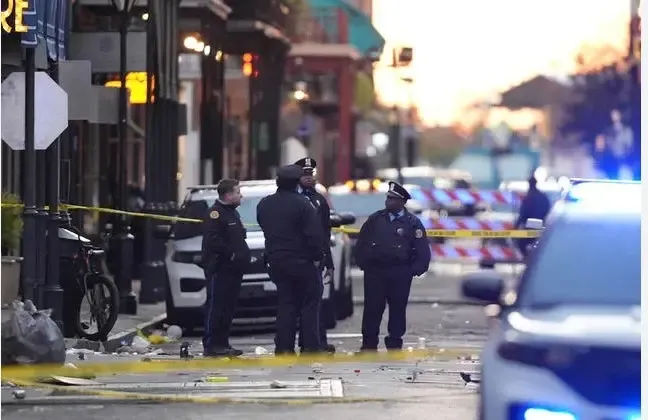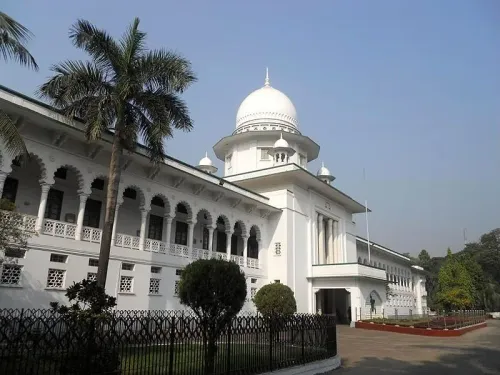The Third Eye: Terrorism Strikes US Territory

New Delhi: The terror assault initiated by an ISIS convert -- Shamsuddin Jabbar -- on New Orleans's iconic Bourbon Street on New Year's Day has emphasized the unsettling truth that Islamic radical groups remain active, functioning globally as 'sleeper cells' and 'lone wolves' eager to implement their schemes, primarily targeting the US and its allies.
Terrorism is fundamentally defined as the use of 'clandestine' violence for a perceived political 'cause', which necessitates a level of 'commitment' influenced by 'motivation'.
The faith-driven motivation behind the notion of Jehad can indeed be potent, which explains why a 'radicalized' individual might undertake a 'suicide mission', similar to what Shamsuddin performed.
Evidence so far suggests he operated as a lone wolf.
Originally from Texas, Shamsuddin had rented a place in New Orleans to orchestrate the attack.
In light of the severity of this event, US President Joe Biden and First Lady Jill Biden visited New Orleans to connect with the families of those affected.
Amidst this incident of terrorism on US territory, three significant developments raise geopolitical concerns for President-elect Donald Trump.
Firstly, it has been reported that several terror suspects were already on the FBI's radar in recent months, suggesting that Islamic radicals are not beyond the reach of the US, especially as cyber channels and social media are being exploited for indoctrinating susceptible individuals.
American security agencies now face an expanded challenge, tasked with identifying and neutralizing such channels, a responsibility shared by the security frameworks of all democratic nations.
Secondly, the terrorist was an Army veteran who had served in Afghanistan, remaining in active duty until 2015, and reportedly resigned in 2020 as a Staff Sergeant.
This case illustrates that 'radicalization' can impact even educated and reasonably well-employed individuals, rather than only disenfranchised youth; however, Jabbar was reportedly facing financial difficulties following his first divorce.
In a video recorded prior to the incident, he spoke of the 'conflict between believers and non-believers' and professed his allegiance to ISIS.
An ISIS leaflet was reportedly discovered in the back of his truck.
It is worth noting that the 'war on terror' initiated by the US post-9/11 primarily targeted Islamic radicals led by Al Qaeda in Afghanistan and ISIS in the second theater of this conflict.
Despite the 'war on terror', the US was compelled to withdraw troops from Afghanistan after reaching an agreement with the Taliban, backed by Al Qaeda, leading to the reestablishment of the Kabul Emirate under the Taliban in 2021.
Pakistan played a clever mediatory role in Doha, aiding the Islamic Emirate of Afghanistan in its pursuit of 'strategic depth' against India.
Shamsuddin Jabbar likely observed with some admiration how Islamic radicals maintained their resolve against the might of the 'US-led coalition'.
This highlights the third aspect of the New Orleans incident, where the terrorist became an admirer of ISIS rather than Al Qaeda, as ISIS has emerged as the face of Islamic radical forces after the elimination of Osama bin Laden and his successor, Ayman Al Zawahiri, by the US in targeted military operations.
The assault in New Orleans adhered to the known patterns of terrorist operations.
The attacker utilized a rented pickup truck to mow down crowds celebrating New Year's Day and indiscriminately fired upon them, resulting in the deaths of 14 innocent individuals and injuries to 35 others.
He had loaded the truck at his residence in Texas with automatic weapons, explosives, and IEDs, reportedly concealing two of the IEDs in coolers at key intersections in New Orleans.
He possessed detonators but was unable to utilize them before his death in a confrontation with police. Shamsuddin shared the animosity that radical factions like Al Qaeda and ISIS harbor towards the US, reflecting the historical legacy of the Wahhabi Jehad that had been called for in the 19th century against Western encroachment on Muslim territories.
Wahhabis argued that Islam faced political decline after a millennium of progress due to the deviation of Muslim rulers from the purest form of Islam observed during the era of the four 'pious' caliphs. Consequently, the call for Jehad was linked with a revivalist vision of returning to original Islamic practices and mandates.
'Radicalization' fostered faith-driven terrorism, which could be countered if an internal voice against it emerged from within the community; a consensus must develop in the Islamic world asserting that terrorist violence is unjustifiable under any circumstances.
It is crucial to recognize that a new Cold War appears to be emerging between the US and the China-Russia axis, which is primarily a political division, being further reinforced by religious alignments, particularly in the Middle East.
Iran is adversarial to the US due to its Shia fundamentalism opposing Capitalism, having brought radicalized Hamas under its influence as Sunni radicals also view the US-led West as their foremost adversary.
Bashar Al Assad, the Syrian President, is an Alawite Shia who enjoys support from Iran, while the US has backed the anti-Assad civil war led by Islamic forces aligned with the West.
These forces carry the historical memory of the Muslim Brotherhood movement's rise in Syria and Egypt in 1928, opposing the 'nationalist pro-Soviet' Arab rulers of that time.
Islamic radical factions are independently fighting against the current Assad regime, aiming to establish an Emirate in Syria.
Unsurprisingly, Russia and China have supported the Syrian President due to their political opposition to the US. Saudi Arabia, the UAE, and Kuwait remain close allies of the US and are open to US mediation to join the so-called Abrahamic accord with Israel.
Islamic radical factions are hostile towards Saudi Arabia because of its alliance with the US.
Iran's animosity towards Saudi Arabia is politically motivated and further fueled by the Shia-Sunni sectarian divide.
Importantly, ISIS took offense at Russia's support for Bashar Al Assad, leading ISIS-K to orchestrate a terror attack during a concert in Moscow in March, killing 130 people and injuring hundreds.
This attack was likely a warning to Russia not to obstruct the spread of 'radicalization' in Central Asia, following the events in Chechnya.
In light of the Russian invasion of Afghanistan and the subsequent success of the anti-Soviet armed campaign driven by the cry for Jehad, during which Al Qaeda was deeply involved, ISIS's resentment towards Russia becomes clear.
As Donald Trump prepares to be inaugurated as the new US President, a significant terror incident has been recorded on US soil.
While the President-elect has yet to outline his national strategy, his unequivocal condemnation of faith-based terrorism stands out as one of the few indicators of his policy direction.
Based on his history, Trump does not seem to advocate for the European Union or NATO, which may prompt a more moderate Russian response in the Ukraine-Russia conflict.
Regarding Israel's actions in Gaza, Trump might encourage Israel to 'declare victory' sooner to prevent the Palestinian issue from becoming a persistent domestic concern.
The new President will likely recognize the negative impact of 'radicalization' on American interests and understand that terrorism is a shared challenge for both the US and India, the two largest democracies.
This shared concern should promote the ongoing strategic partnership between India and the US, as India is well aware of the roots of radicalization, further strengthening this alliance.
India's security apprehensions are significantly focused on the Sino-Pak axis, which is actively engaged in covert operations against India, illustrated by the use of Chinese drones by Pakistan to transport arms and narcotics into Punjab and Kashmir.
The Trump Presidency will need to assess its stance on Pakistan, a nation under military control with a complex relationship with Islamic radical forces.
Tehreek-e-Taliban Pakistan (TTP) is pushing Pakistan towards stricter Islamic governance.
It is noteworthy that Khyber Pakhtunkhwa (KP), where the TTP is strong, was the epicenter of the anti-British Wahhabi revolt on the Indian subcontinent, leaving the area highly radicalized.
India's foreign policy, which prioritizes bilateral and multilateral partnerships based on shared security and economic interests, acknowledges a multipolar world and advocates for global peace and human development, aligns well with the Trump Presidency.
The 'America First' doctrine may primarily serve US economic interests and may not necessarily adopt an interventionist approach or a tendency for military actions in various conflict zones.
This 'country first' philosophy should not create contradictions in the Indo-US relationship.
Moreover, as a leader in Information Technology, India is anticipated to maintain its position in the emerging domain of Artificial Intelligence (AI).
India and the US can collaboratively advance the 'knowledge economy' for the benefit of global society. Following the Cold War, we have entered an era of 'proxy wars', where direct military confrontations are being replaced by 'clandestine' operations aimed at undermining and defeating adversaries.
In addition to cyber attacks, externally instigated separatist movements, insurgencies fueled from abroad, and the utilization of social media as a warfare tool by crafting 'narratives' through misinformation and deepfakes to destabilize regimes represent new forms of 'asymmetric warfare', which complicate the task of safeguarding national security.
Friendly nations must comprehend each other's concerns in this context.
Strengthening international collaboration is essential to combat threats such as terrorism, narcotics trafficking, and human trafficking, and it is hoped that India and the Trump administration will align in addressing these global challenges.
(The writer is a former Director of the Intelligence Bureau. Views are personal)









